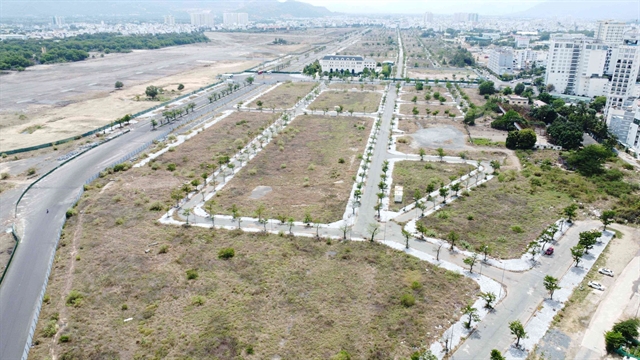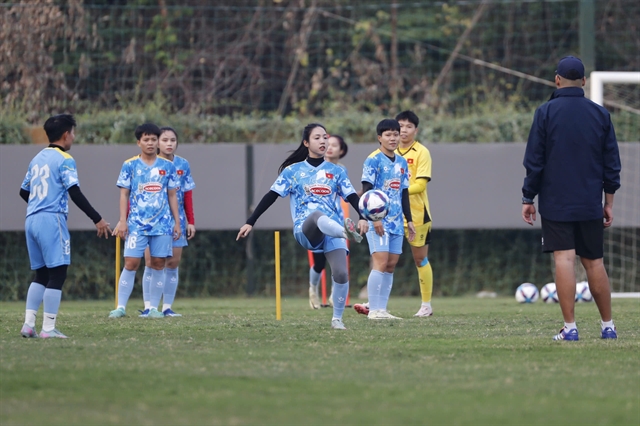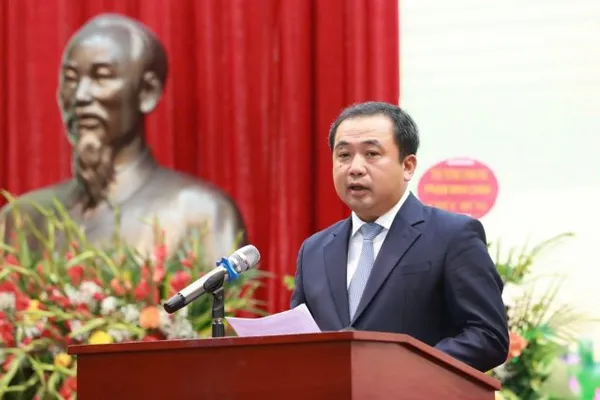 Politics & Law
Politics & Law


|
| Minister of Education and Training Nguyễn Kim Sơn delivers his speech at the 10th session of the National Assembly on Wednesday morning in Hà Nội.— VNA/VNS Photo Minh Đức |
HÀ NỘI — Việt Nam is moving to modernise its education system with major reforms, including a proposal for a single national set of textbooks and changes to higher and vocational education, Minister of Education and Training Nguyễn Kim Sơn announced on Wednesday at the 10th session of the National Assembly.
At the session, Sơn presented three draft laws amending certain provisions of the Law on Education, the Law on Higher Education, and the Law on Vocational Education and Training.
Presenting the key contents of the draft amendments to the Law on Education, Sơn said the draft clearly stipulates that the State will provide a single set of textbooks to be used across the country.
The move aims to ensure equal access to quality, modern education aligned with national educational goals.
Under the proposed legislation, the Government will regulate the free distribution of textbooks to students while promoting appropriate socialisation measures to guarantee sustainability and improve educational quality.
Compilation, appraisal and issuance of the unified textbooks will follow a rigorous, scientific process that builds on existing achievements while addressing current shortcomings.
The draft also revises and clarifies definitions of diplomas and certificates within the national education system, allowing them to be issued in paper, electronic or digital formats, all with equal legal validity.
A notable change in the draft is the removal of the secondary school graduation certificate.
Instead, school principals will simply certify that students have completed the curriculum.
The reform reflects the universalisation of secondary education, streamlines administrative procedures, reduces exam-related pressure, and aligns with international practice, as many developed countries do not issue secondary diplomas but instead confirm completion for further study or career orientation.
Modernising higher education
Regarding the draft amended Law on Higher Education, Sơn said the proposed law aims to institutionalise the Party and State’s policies on strategic breakthroughs and the modernisation of higher education.
It seeks to position universities as a crucial engine of innovation within the national system, as centres for high-quality human resources training, scientific research, technological advancement, and international integration.
The draft also addresses existing bottlenecks and inconsistencies in the current law, while improving the legal framework governing higher education to make it more coherent and effective.
It aims to enhance State management efficiency, develop modern governance models suited to Việt Nam’s conditions, and strengthen university autonomy and accountability.
Sơn stressed the goal of nurturing elite and high-quality education to elevate national intellectual standards, while ensuring mass education continues to raise general knowledge and meet workforce demands.
Universities are expected to become hubs of science, technology and innovation closely linked to the training of high-level human resources.
The draft law also proposes mechanisms to mobilise public and private resources, unlock institutional and creative potential in universities, modernise infrastructure, and expand the scale and quality of higher education to meet the country’s sustainable development needs.
Upgrading vocational education
The amended Law on Vocational Education and Training is designed to meet the requirements of Việt Nam’s economy amid rapid digital transformation, a transition towards a green economy, and deeper integration into global value chains.
The law aims to align the national Vocational Education and Training system with international and regional standards, thereby facilitating the mobility of Vietnamese workers and enhancing their ability to seek employment abroad.
The draft law seeks to promote innovation and raise the quality of vocational education by introducing mechanisms that encourage stronger enterprise participation in training and employment of skilled workers.
It also enhances the autonomy and accountability of vocational education and training institutions, broadens and diversifies training models and ensures the flexible and equitable recognition of learning outcomes and professional skills.
The amended law sets out provisions on the national vocational education and training system, the organisation and operation of vocational education institutions, and State policies and management in this field.
Appraisal opinions
Presenting the appraisal report, Chairman of the National Assembly’s Committee for Culture and Education Nguyễn Đắc Vinh affirmed the necessity, objectives and guiding principles of the three draft laws.
Regarding textbooks and local educational materials, the committee supported the proposal for a unified set of national textbooks.
However, it recommended allowing provinces and cities with distinct cultural or linguistic characteristics to compile their own supplementary materials, prepared by provincial education authorities and approved by the Chairperson of the provincial People’s Committee.
The approach would preserve regional cultural identity while maintaining national curriculum consistency.
On the abolition of secondary school graduation certificates, the committee agreed that the reform would simplify administrative procedures and better reflect actual learning outcomes.
However, it emphasised the need to specify the format, legal validity and electronic storage methods of the new completion certificates to ensure consistency and transparency.
Reviewing the draft amended Law on Higher Education, the committee agreed that universities should be recognised as scientific and technological institutions with autonomy in research, application and technology transfer.
It recommended, however, that the law include clearer mechanisms for collaboration among the State, universities and enterprises, as well as regulations on ownership, valuation and benefit-sharing of intellectual property and research outcomes to promote commercialisation.
The committee also urged a review of provisions related to joint academic appointments to ensure consistency with the Law on Science, Technology and Innovation, and avoid conflicts between legal frameworks.
As for the draft amended Law on Vocational Education and Training, the committee viewed it as an essential step in restructuring the national workforce, addressing the imbalance between theoretical and practical training and fostering stronger links between schools and businesses.
It supported revisions aimed at aligning vocational education with labour market demand, while enhancing the application of digital technologies and promoting digital transformation in vocational training.
Continuing the 10th session’s agenda, the National Assembly on Wednesday morning also discussed the draft amended Law on Civil Aviation and the draft amended Law on Public Employees. — VNS




